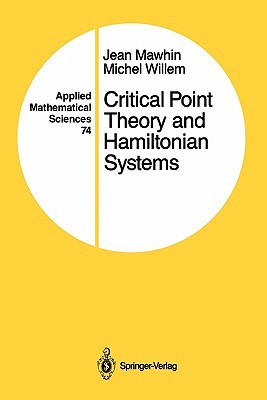
- We will send in 10–14 business days.
- Author: Jean Mawhin
- Publisher: Springer
- ISBN-10: 1441930892
- ISBN-13: 9781441930897
- Format: 15.6 x 23.4 x 1.6 cm, softcover
- Language: English
- SAVE -10% with code: EXTRA
Reviews
Description
FACHGEB The last decade has seen a tremendous development in critical point theory in infinite dimensional spaces and its application to nonlinear boundary value problems. In particular, striking results were obtained in the classical problem of periodic solutions of Hamiltonian systems. This book provides a systematic presentation of the most basic tools of critical point theory: minimization, convex functions and Fenchel transform, dual least action principle, Ekeland variational principle, minimax methods, Lusternik- Schirelmann theory for Z2 and S1 symmetries, Morse theory for possibly degenerate critical points and non-degenerate critical manifolds. Each technique is illustrated by applications to the discussion of the existence, multiplicity, and bifurcation of the periodic solutions of Hamiltonian systems. Among the treated questions are the periodic solutions with fixed period or fixed energy of autonomous systems, the existence of subharmonics in the non-autonomous case, the asymptotically linear Hamiltonian systems, free and forced superlinear problems. Application of those results to the equations of mechanical pendulum, to Josephson systems of solid state physics and to questions from celestial mechanics are given. The aim of the book is to introduce a reader familiar to more classical techniques of ordinary differential equations to the powerful approach of modern critical point theory. The style of the exposition has been adapted to this goal. The new topological tools are introduced in a progressive but detailed way and immediately applied to differential equation problems. The abstract tools can also be applied to partial differential equations and the reader will also find the basic references in this direction in the bibliography of more than 500 items which concludes the book. ERSCHEIN
EXTRA 10 % discount with code: EXTRA
The promotion ends in 15d.07:32:12
The discount code is valid when purchasing from 10 €. Discounts do not stack.
- Author: Jean Mawhin
- Publisher: Springer
- ISBN-10: 1441930892
- ISBN-13: 9781441930897
- Format: 15.6 x 23.4 x 1.6 cm, softcover
- Language: English English
FACHGEB The last decade has seen a tremendous development in critical point theory in infinite dimensional spaces and its application to nonlinear boundary value problems. In particular, striking results were obtained in the classical problem of periodic solutions of Hamiltonian systems. This book provides a systematic presentation of the most basic tools of critical point theory: minimization, convex functions and Fenchel transform, dual least action principle, Ekeland variational principle, minimax methods, Lusternik- Schirelmann theory for Z2 and S1 symmetries, Morse theory for possibly degenerate critical points and non-degenerate critical manifolds. Each technique is illustrated by applications to the discussion of the existence, multiplicity, and bifurcation of the periodic solutions of Hamiltonian systems. Among the treated questions are the periodic solutions with fixed period or fixed energy of autonomous systems, the existence of subharmonics in the non-autonomous case, the asymptotically linear Hamiltonian systems, free and forced superlinear problems. Application of those results to the equations of mechanical pendulum, to Josephson systems of solid state physics and to questions from celestial mechanics are given. The aim of the book is to introduce a reader familiar to more classical techniques of ordinary differential equations to the powerful approach of modern critical point theory. The style of the exposition has been adapted to this goal. The new topological tools are introduced in a progressive but detailed way and immediately applied to differential equation problems. The abstract tools can also be applied to partial differential equations and the reader will also find the basic references in this direction in the bibliography of more than 500 items which concludes the book. ERSCHEIN


Reviews